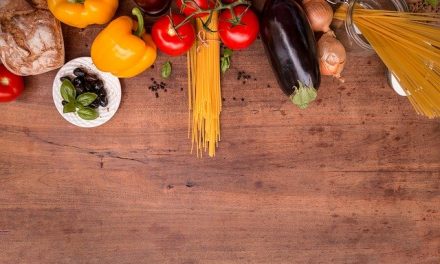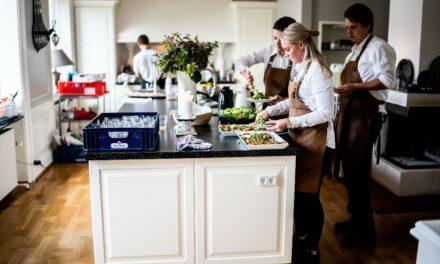Everybody loves a nice and yummy brunch on a Sunday, where all the family can sit peacefully around the table, without needing the rush through breakfast because they need to go to school or the office. You can take the time to enjoy each other’s presence, to talk about the previous week and to discuss the week to come, all around a delicious and inspiring late breakfast. If you’re thinking about a pile of scrumptious pancakes oozing with melted butter and maple syrup; think again. It’s time to surprise your family with something a little different but equally delicious, namely the king of continental breakfast: A French Breakfast. If you’ve never had a French breakfast before, let me reassure you first: They don’t eat snails or garlic for breakfast. In fact, the French breakfast is surprisingly healthy despite its indulgent appearance – so it’s a win-win as one of the most important meals of the day. So, if you’re ready for an adventure down the baking lane, roll up your sleeves and start planning for a deliciously nutritious French extravaganza that will wow your family. One last piece of advice before you start: Keep things and tastes simple, as it will be a lot easier to manage and prepare.
Everything starts with bread
There is no French meal – whether it is breakfast, lunch or dinner – without bread. Bread is the personification of the French culture, and if you’ve ever set foot in a French bakery, it’s easy to understand why. There is such a vast selection of flavours, flours and shapes, that it’s impossible to understand why most people think of the baguette when they think of the French culture. As a rule of the thumb, you’ll find that most French households prefer the baguette as a quick go-to option for lunch and dinner during the week. However, when comes the weekend, they take the time to satisfy their taste buds with more rustic and traditional loaves of bread. If you’re feeling confident, you can knead your bread the evening before and bake it in the morning, so that it’s still warm and fresh out of the oven for breakfast. Don’t worry if you’ve forgotten to prepare your rustic bread dough; you can wipe an easy Irish soda bread in under an hour which is perfect for late risers in the morning. Don’t worry about the fact it’s called Irish soda bread. French bakeries embrace diversity and tastes, from the typical baguette to an Italian ciabatta or a German pretzel. Any bread you choose will do just fine for your French breakfast! Bonus points for the homemade options, but if you’re running out of time or worried about your bread-making skills, you can buy a delicious artisan bread too. Give it a few minutes in the oven before serving, so that you can get the warm right-out-of-the-oven taste.
You need a warm drink in a bowl
A typical French breakfast doesn’t serve coffee or tea in a mug, but you pour it in a bowl instead. There’s an element of countryside lifestyle in lining up your bowls on the kitchen table that you’ll love. The main reason for using a bowl it that’s it makes it easier then to dunk the famous tartines – aka warm slices of bread with butter and jam – into your beverage. Don’t frown in disgust; it’s a traditional way of eating. So, the first thing you need to do to make sure you can have a wonderful bite of your tartine is to upgrade your coffee maker – you can find here the top reviewed coffee makers on the market. Ultimately, you don’t want to drink instant coffee in the morning; you need something stronger. Don’t worry, if you’re not a coffee lover, you can find some excellent French teas too. Contrary to the common belief, used to be a popular beverage in France until the French Revolution. It became less popular at the end of the 18th century but the trend has since been revived with traditional French tea parties and flavours.
There’s always a freshly pressed juice
If you’ve been wondering how the French women manage to always look so slim, their favorite breakfast fruit might be the answer to this mystery. Grapefruit is a typical choice in France, either consumed cut in half with a dented spoon or freshly pressed in a glass. And grapefruit has many benefits if you’re trying to lose weight. For a start, besides being full of vitamins and minerals, grapefruit juice also helps to curb your appetite so that you feel full sooner. By acting on your appetite, it, of course, drives you to eat fewer calories without suffering from hunger pans. The best moment to drink a glass of fresh grapefruit juice is 20 minutes before you eat, but admittedly, this can be difficult to arrange when you’re planning a family breakfast. However, you will still notice the positive effect of the juice even if you consume it at the beginning of your breakfast. On average, you can eat around 20% fewer calories, which can explain the typical French silhouette.
What do you take with your bread?
Surprisingly enough, while most American shops have aisle filled with sweet spreads for their morning toasts, the French breakfast prefers a much simpler alternative. You’ll find no more than a little butter and a pot of jam – preferably homemade – on a French table. By keeping the spread options limited, you can also keep a clean taste of every ingredient. It would be a pity to hide the delicious flavour of freshly made bread under processed sweet pastes. So instead, pick your favorite seasonal fruit and make your jam, if you’ve got the time. Jamie Oliver has an excellent recipe for a strawberry jam that will keep your family asking for more! In half an hour you can make fresh hot jam, so it’s something you can start preparing at the same time that your bread, so that you can account for the necessary cooling time before serving. Everybody loves warm jam, so don’t worry if it isn’t completely cool when you spread it on your warm bread! The French favorites in terms of jams and marmalades are strawberry, orange and figs in the south. In northern regions, you’ll find more berry-based jams and less sunny fruits. In central France, there is not a breakfast table without a little pot of rose petal jams, which is deliciously sweet.
The savoury version
For a late breakfast or a brunch, you can choose to add a savoury touch to your meal. In fact, on Sundays, it’s perfectly acceptable to find some fresh cheeses and cured salmon on your breakfast table. If you’re worried about unpasteurized cheeses, which can be a large portion of French cheeses, you can find safe and pasteurized equivalents in gourmet shops and through professional cheesemakers. What are the best cheeses to pick for a French breakfast? A soft goat’s cheese is a great option, as the subtle taste can be delicately creamy and goes well with a homemade fig jam, for instance. Goat’s cheese tastes evolve as the cheese ages, which means that you find much stronger and tangier accents in older cheeses. If you want something typically French and very flavorsome, you should pick a Roquefort, which is the king of blues. Its blue heart is the perfect companion to fresh and runny honey on toast!
Never without a pastry
There is no Frenchman without a croissant, and as a result, you can’t have a proper French breakfast without upping your pastry game. While you can make most pastries at home, it’s probably easier to find a bakery you can trust to give you the best and most traditional French croissants. If you’re feeling adventurous, you can replace the croissant by a delicious eclair, which is just the right amount of indulgence for your breakfast. The traditional flavor for the eclair is vanilla filling with a chocolate icing, but you can find plenty of exciting fruity flavors in expert patisseries.
And not to be forgotten
Last, but not least, French breakfasts are meant to last a long time. It’s the meal that brings everyone together, and that lets you accustomed yourself to the news of the day as well. As a result, if you want to master the art of a proper French breakfast, you need to know how to read the newspaper and eat at the same time. Funny enough, it was already a major point of interest in the 1980s, as this NY Times article reveals. Admittedly, it’s best not to isolate yourself behind the pages of book or magazines over breakfast when you could instead enjoy the family time together. However, it’s a useful skill to develop if you ever find yourself eating on your own in a restaurant or if you want to enjoy a little bit of me-time at the breakfast table before your family gets up.
In short, get your baking hat on, it’s time to prepare a French breakfast with style, taste and a lot of fun! As they say in France, bon appétit!
This is a contributed post which is explained in our Privacy Policy.





when I first arrived. Breakfast is the most important meal of the day to Americans and, in France, it often feels like an afterthought.